Humanities & Social Sciences
The International Conference on Gender Studies in Africa opens at Makerere
Published
4 years agoon
By
Jane Anyango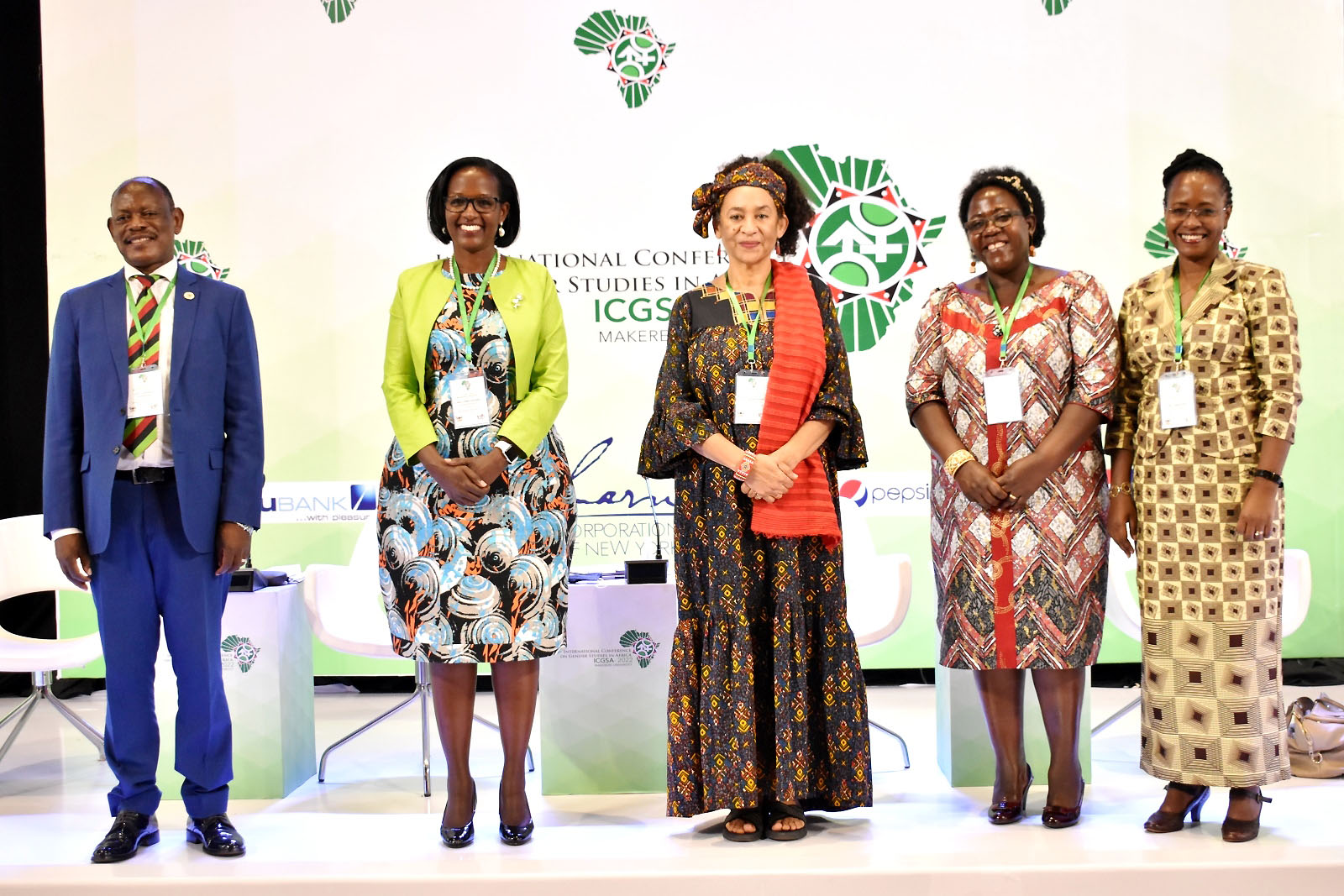
The First Lady and Minister of Education and Sports Hon. Janet K. Museveni represented by the Vice President of the Republic of Uganda H.E. Jessica Alupo on 23rd February 2022 officially opened the International Conference on Gender Studies in Africa (ICGSA) at Makerere University.
The conference was organized by the College of Humanities and Social Sciences (CHUSS) through her School of Women and Gender Studies (SWGS) as part of the celebrations to mark the 30 years of the School’s existence. SWGS was the first and remains the biggest School of Women and Gender Studies in Africa.
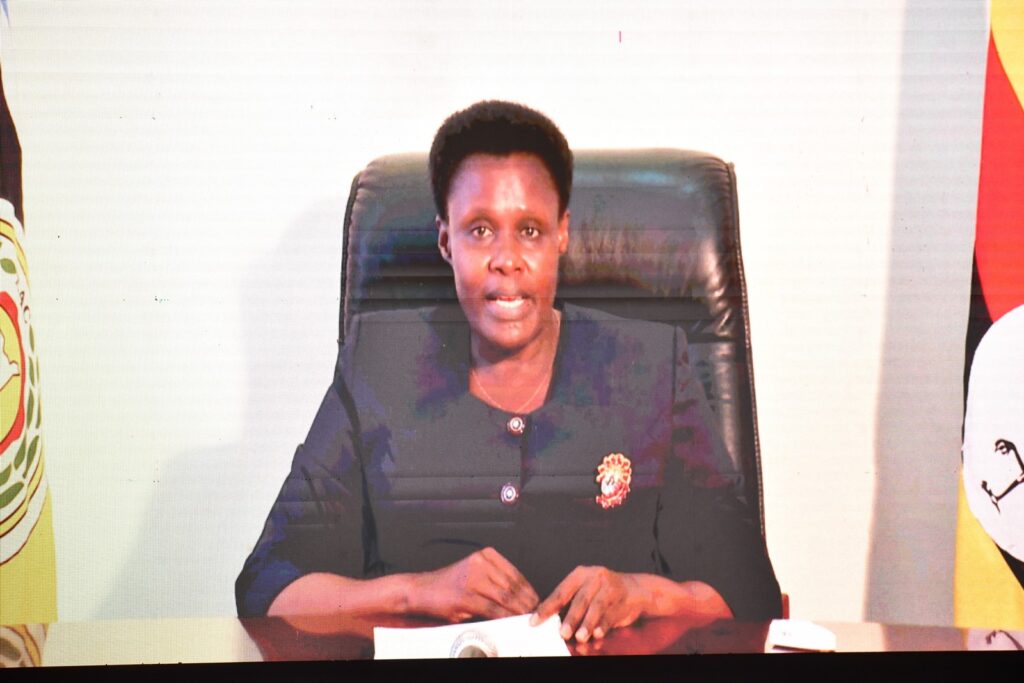
The conference was also organized as part of the celebrations to commemorate a century of excellent service to humanity by Makerere University. The conference was organized as a platform for Gender Scholars the world over to network, share experiences and establish lasting collaborations that will shape Gender Studies in Africa.
Among issues on the agenda was the reflection on teaching of gender studies and how to improve it, gender focused research, how gender has been applied in the field of practice as well as impact and benefits of gender studies in Africa.
The conference brought together more than 480 papers from African scholars with an endorsement of more than 30 gender studies programs on the continent and beyond. These have come from universities all over Africa and in the diaspora with representations from the USA, Canada, UK, Hungary, Czech Republic, Israel, India, Australia, and Latin America among others.
The Dean School of Women and Gender Studies, Assoc. Prof. Sarah Ssali in her introductory remarks acknowledged that the School’s establishment in November 1991 was a result of a protracted struggle by the Uganda Women’s Movement, particularly organisations such as Action for Development (Acfode) and the Makerere University Women’s Association.
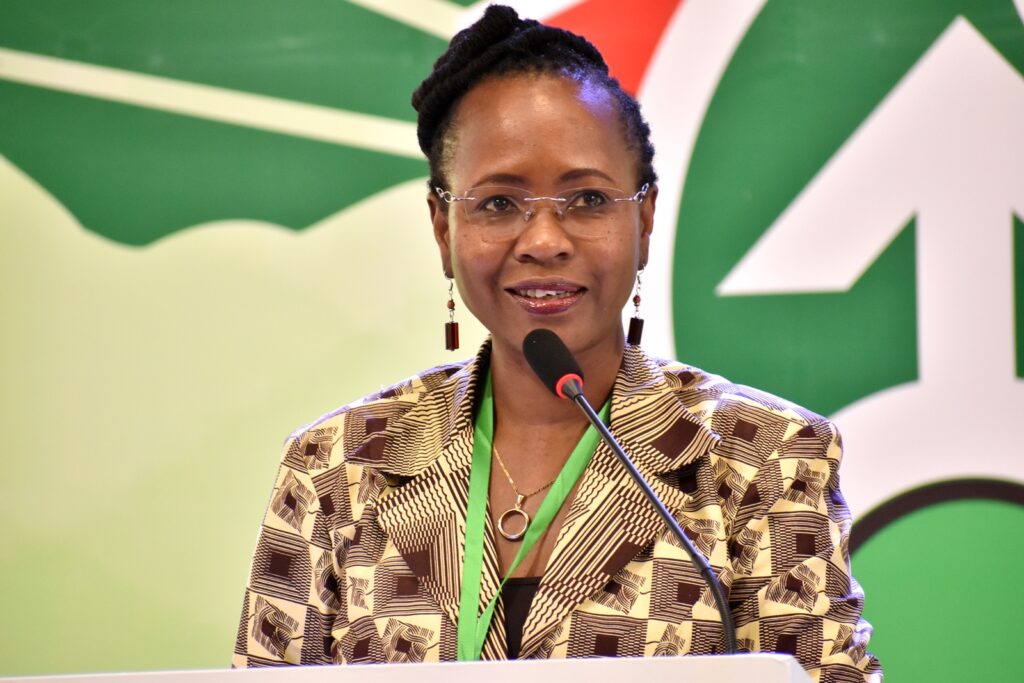
“These organisations and others that have come on board like UWONET, UN WOMEN and the rest have continued to nurture the School. For example Acfode and UN WOMEN in particular have are even part of the funding of this event,” The Dean lauded.
She paid tribute to former heads such as Prof. Maxine Ankrah, Prof. Victoria Mwaka, Prof. Joy Kwesiga, Prof. Rosemarie McNairn, Prof. Grace Bantebya Kyomuhendo, Prof. Consolata Kabonesa, Prof. Josephine Ahikire on whose shoulders the School has stood throughout its 30year journey.
Assoc. Prof. Ssali acknowledged that the 30year celebration was not simply a Makerere affair but a Pan-African celebration, in appreciation of various actors who have in the recent past contributed to the debate on what neoliberalism has done to the academy, including the teaching of gender studies.
“Several meetings have been held to make sense of what these challenges mean for the academia and particularly for the discipline of gender studies. And it was at one such meeting convened to discuss the effect of neoliberalism on gender studies in the academy in Africa held in Bellagio, Italy in August 2019 that the need to discuss the peculiarities of the discipline faced in a neoliberal Africa gained traction.
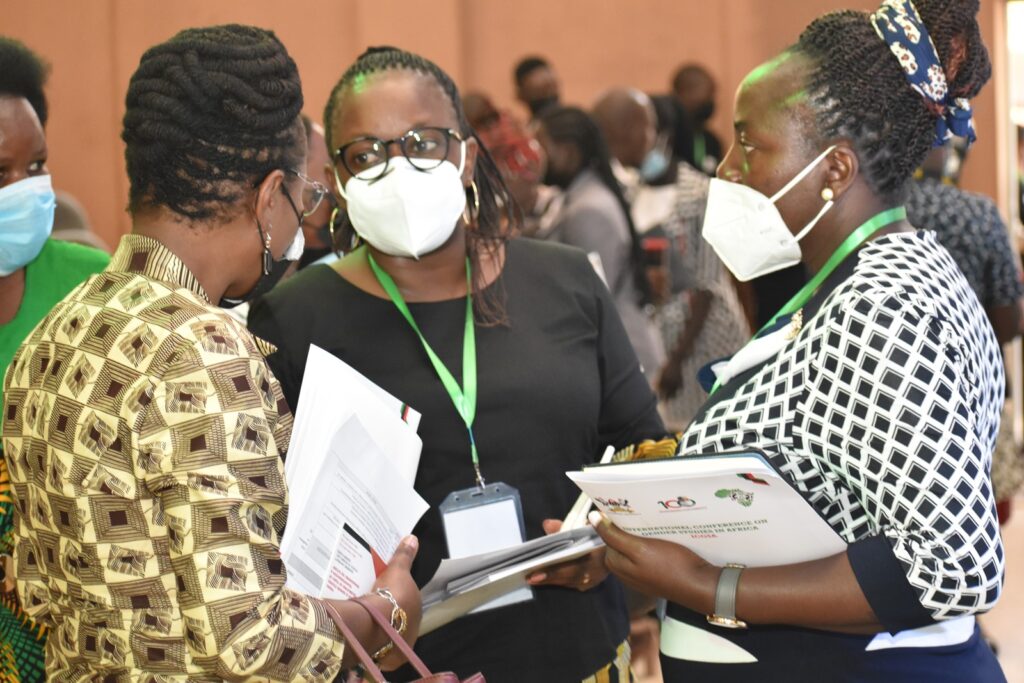
This Conference was endorsed by several gender units in Africa and today we are happy to have some of those who attended the Bellagio meeting such as Prof. Amina Mama and Prof. Joy Kwesiga physically joining us for these three days.” Assoc. Prof. Ssali said.
The keynote address on, “Gender Studies in Africa-Current status and Developments” was delivered by Prof. Amina Mama, from the Institute of African Studies, University of Ghana.
Prof. Mama’s address dwelt on the history of women’s resistance to oppression as a source of gender studies and what motivated women to organize, come to university, start gender studies and create space for girls and women to mitigate their suffering.
Feminism, according to Prof. Mama, responds to male supremacy and the system of gender that is colonially beguiled to Africa that keeps men and women down and opposed to one another instead of familiarizing with and learning from one another.
Prof. Mama stressed the need for African scholars to study, know and write their own history and broaden their perspectives, noting that without knowing their roots, they may not know their future.
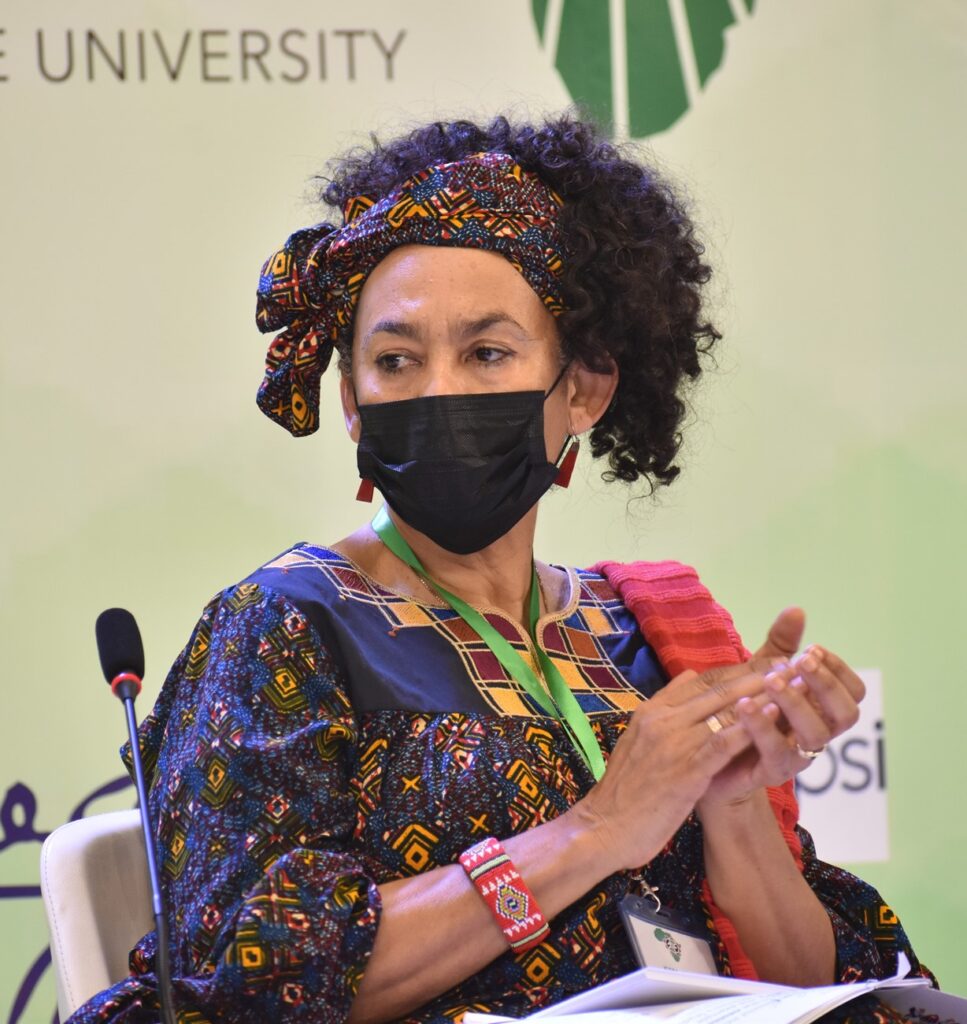
The keynote speaker observed that although Africa is the youngest continent with a median age of 19, 90 % of her potential not realized. She pointed out that the number of youth unemployed is growing and even in their earlier retirements, there is no system to absorb their energy to ensure that the live a decent life.
Prof. Mama also decried Africa’s governments’ captivity to debts paid by people living in poverty.
“So we have to do something serious and education is part of it. We have to educate people and equip them with skills to manage the future. The global focus contradicts but we need to take serious account of our situation and the fact that this poor continent’s brains and resources are flowing from Africa to the West.
So the constant drainage of our public sector and infrastructure should be in the global economic doctrine; they defeat all our aspirations to become a whole people and thriving community of our people”. She said.
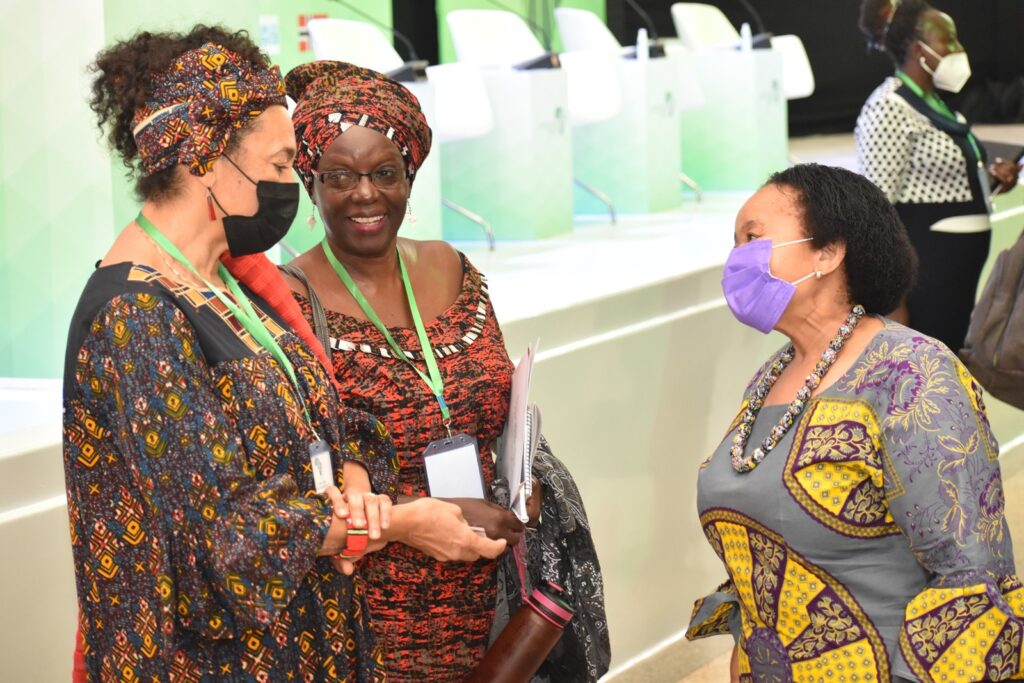
For women, the professor said, there are particular things excluding them including rivalry from men and men’s fear of women that makes men oppressive to find the right direction. She said men and women need to be educated about these colonial attitudes including more communication and mutual respect for one another.
In her opening remarks virtually read for her by the Vice President H.E. Jessica Alupo, the First Lady and Minister of Education and Sports applauded the School of Gender and Women Studies for managing to achieve a leading and unique position in global gender and feminist studies, in terms of teaching, research and service to the community. This, she noted, has been complemented by supporting sister universities and colleges across Africa to establish units that address issues of gender inequality and poverty.
Mrs. Museveni noted that although Africa is endowed in terms of natural resources and powered by a potentially dynamic youthful population, the continent will not take her place at the table with other nations until her women, who form half of her population are liberated and enabled to fully participate in the development of the continent.
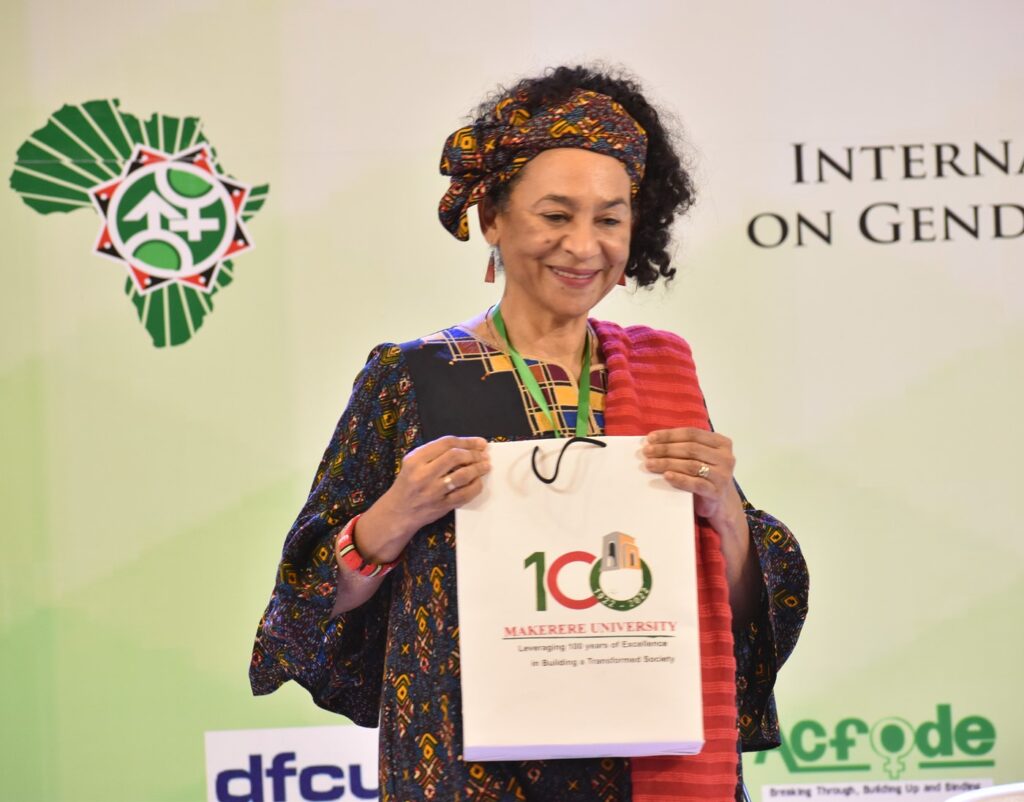
“Gender inequality significantly hinders the ability of individuals to participate fully and contribute to their families and communities-economically, politically and socially. Gender inequalities limit the ability of women and girls to fully participate in and benefit from development programs in our nations. Institutions such as patriarchy, religion, family and marriage as well as social and cultural practices continue to play a major role in perpetuating gender inequalities”, Part of the speech read.
The Minister pointed out hindrances such as policy making approaches in the higher education sector which continue to reinforce images of women in one field and men in another and urged governments to be cautious of the gaps and weakness in policy making.
“New approaches must be adopted to enable us change history, customs and traditions of college admissions which still largely favour men, and enable us address the conundrum of gender inequality in higher education systems.
Such approaches should seek to achieve gender equality in institutions of higher learning, tackling specific system imbalances that still manifest and plague such institutions. The absence of gender balance in such areas will continue to discourage social advancement and empowerment of disadvantaged groups in the population, specifically women”, the Minister advised.
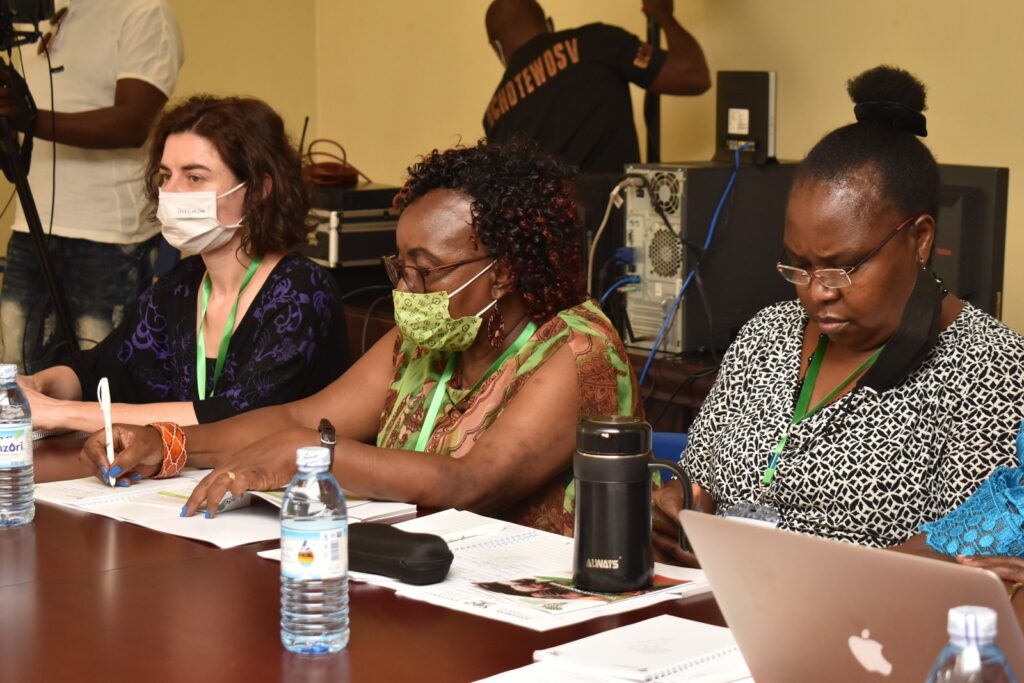
The other issue of concern according to the Minister is the family and healthcare dynamics that have long-term implications for children as they grow up. She said, achieving gender equality that facilitates health starts with putting the mother and child at the center and prioritizing health at home and in the clinic by supporting breast feeding, and promoting safe and family-friendly access to primary health care.
The Chairperson, Makerere University Council Mrs. Lorna Magara said the University started out as a male-dominated institution with the motto, “Let us be men.” The terrain, she said, gradually changed, and so did the motto, which later became “We Build for the Future,” as more women were admitted. Mrs Magara reported that, it was not until the 1990s that the University started pursuing definite steps towards a broader gender agenda.
“Today the University boasts of the School of Women and Gender Studies, a Gender Mainstreaming Division, a Gender Equality Policy, and an Anti-Sexual Harassment Policy. The University has also championed affirmative action for females entering the university, including a 40% enrolment of females in STEM disciplines. The School of Women and Gender Studies has been at the centre of this advancement, starting from its role in forming the Gender Mainstreaming Directorate to track Makerere’s progress in mainstreaming gender in its systems and processes”, Mrs. Magara stated.
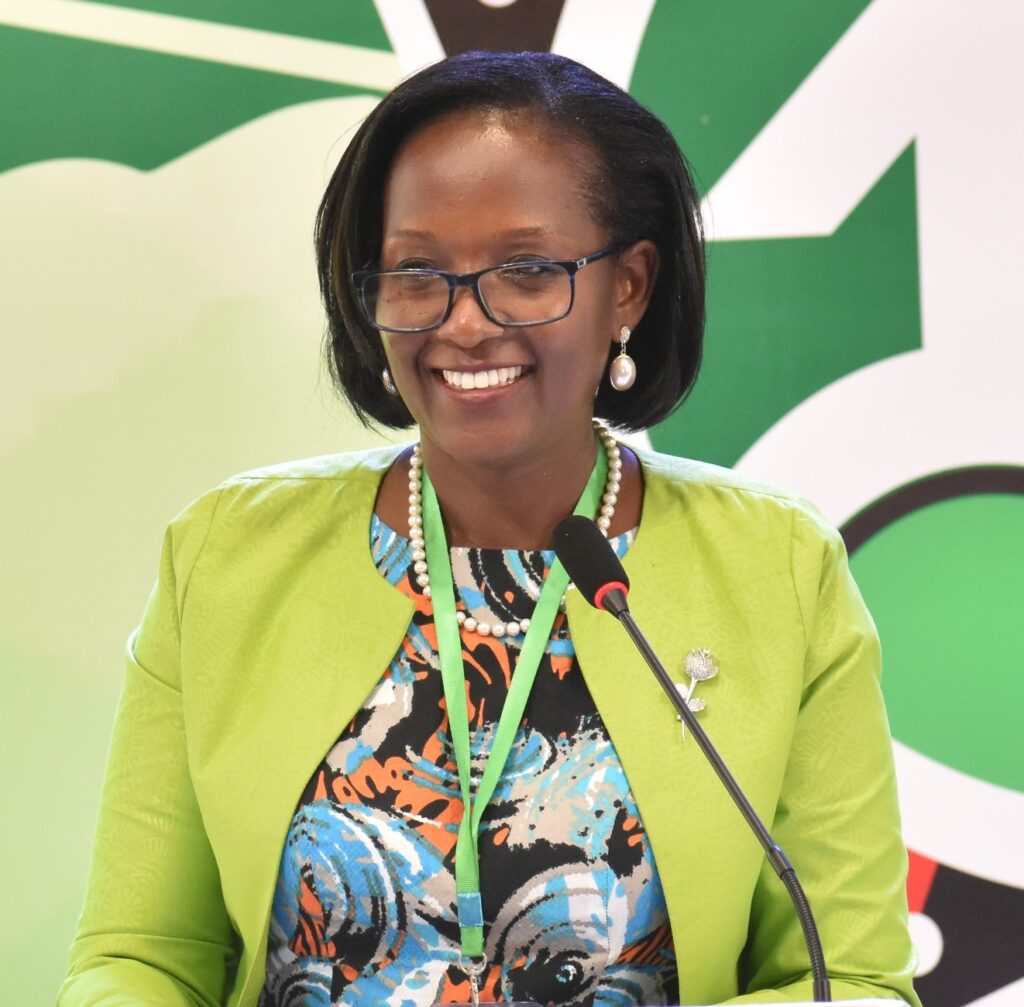
The Council Chair also said, the School has not only produced a critical cadre for the government’s Gender Mainstreaming agenda, but has also trained human resources for other countries on the continent and beyond. Many of its products hold significant positions in academia, government departments, and non-government entities.
“This celebration, therefore, is not just for the School, but a Pan-African and indeed global celebration, with all the sister institutions that the School has walked with over the years. A Pan-African celebration of gender studies is essential for nuance about gender, gender studies, and gender practice”, Mrs. Magara said.
She expressed hope that in addition to providing a platform for a comprehensive review of gender studies in Africa in all aspects of teaching, theorizing, research, and practice, the conference also offers an opportunity to develop frameworks that will be used to study the unique scenarios as a continent, strengthening collaboration between academics and practitioners as we chart the path that will transform the continent.
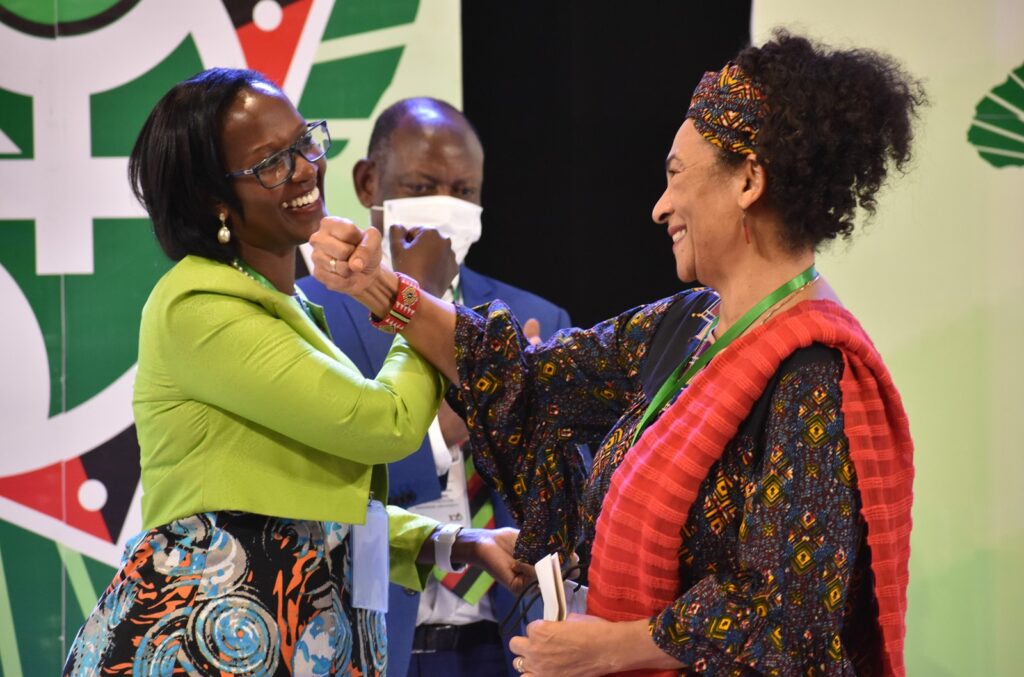
The Vice Chancellor Makerere University, Prof. Barnabas Nawangwe observed that in order for Africa to move to middle-income status and achieve sustainable development, human capacity development must be put at the fore.
Prof. Nawangwe stressed the need to ensure that issues of gender, historical injustices and women empowerment are tackled acknowledging that the interventions made by Uganda in this matter have already produced positive results.
The Vice Chancellor reported that the School of Women and Gender Studies has been at the forefront of empowering women through her academic programmes and research.
“The School hosts one of the thirteen Centres of Excellence of the African Research Universities Alliance (ARUA) – the Centre of Excellence in Notions of Identity. Through this Centre and other programmes, the School is making a major contribution to understanding the role of gender in socio-economic development. The research conducted in the School is informing policy on gender issues. The students, who have gone through the School are making a difference in society”, the Vice Chancellor said.
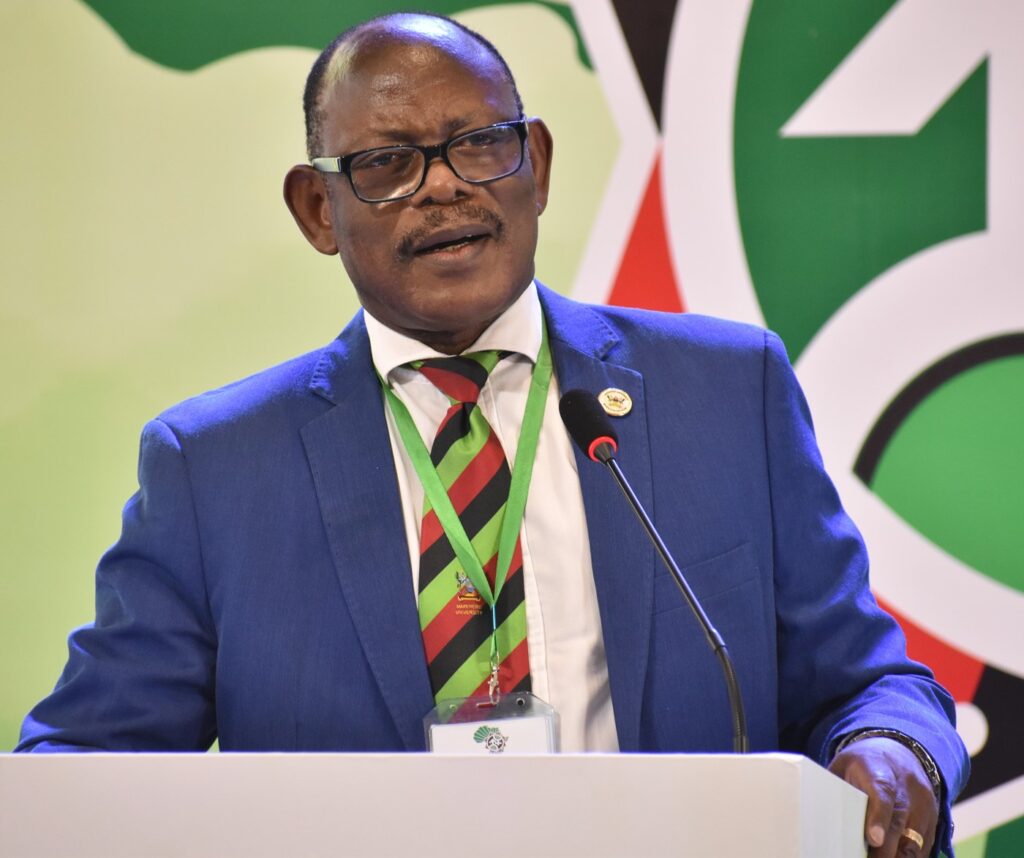
Prof. Nawangwe advised that as the university celebrates the thirty years of the School, there is need to pause and reflect on achievements made, the challenges still faced and opportunities that present themselves.
With the strategy of becoming a fully research-led University by 2030, Prof. Nawangwe expressed the need to double efforts in research on women and gender issues, find solutions to problems that still deter human development, including issues around domestic violence and exploitation of labour by women, including unpaid domestic work by house wives.
The Vice Chancellor also expressed the need to continue to interrogate the factors that still hinder women participation in science, keeping in mind that a woman, Valentina Tereshkova was the second person to undertake a sole trip into outer space and that another woman, Marie Curie is one of the greatest chemists of all time.
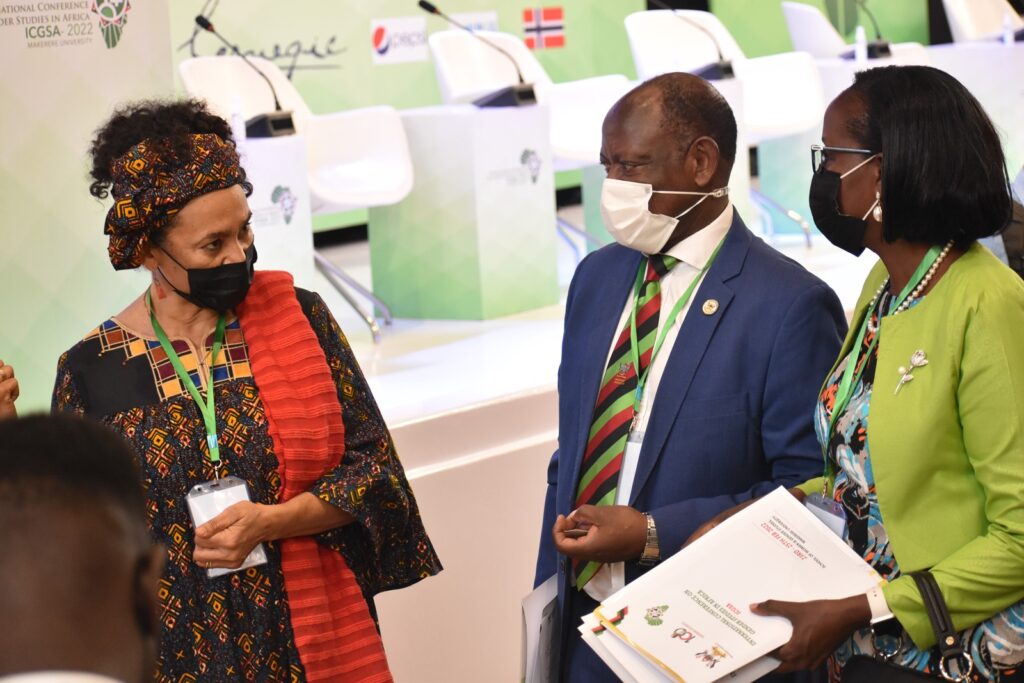
Prof. Nawangwe acknowledged that many African women have set the pace for women participation in science, adding that there is no reason why African women cannot take the lead in science and technology.
The Vice Chancellor stressed the need to carry out research and formulate policies that will unlock the huge potential of women in transforming society and taking advantage of their big numbers to create a critical mass of scientists to move the Continent’s development agenda forward.
“Makerere University remains committed to the promotion of women in all spheres of university life. Over the last two decades, through our affirmative action policies, the enrolment of female students has increased from 15 % to 51% and the participation of women in academic and administrative leadership has grown from 5% to 35%.
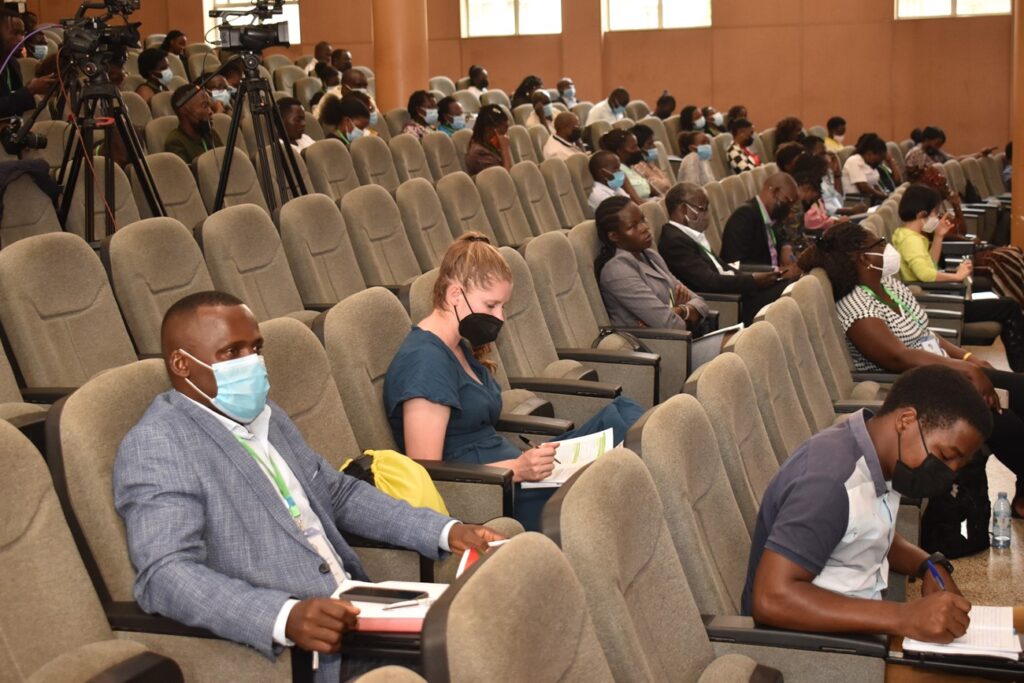
Three out of the nine college principals are women, our new Grants Administration and Management Support Unit is headed by a woman and our biggest research portfolio is also headed by a woman. We must be the example that our Continent needs to transform our society through total emancipation of our women from marginalisation. This we will do with all the resources available to us.” The Vice chancellor pledged.
The Principal College of Humanities and social Sciences Assoc Prof. Josephine Ahikire thanked the university and college management, the staff and students for beating all the odds of COVID 19, budget cuts and the malaise to organise the celebrations.
“30 years is no mean achievement. The School has been able to emit transformational energy, in terms of curriculum development, teaching and learning, research, and knowledge transfer informed by critical thinking.
The alumni of the School has played a critical role in government ministries, agencies and departments and many institutions and women group organisations making a difference in society”, The Principal said.
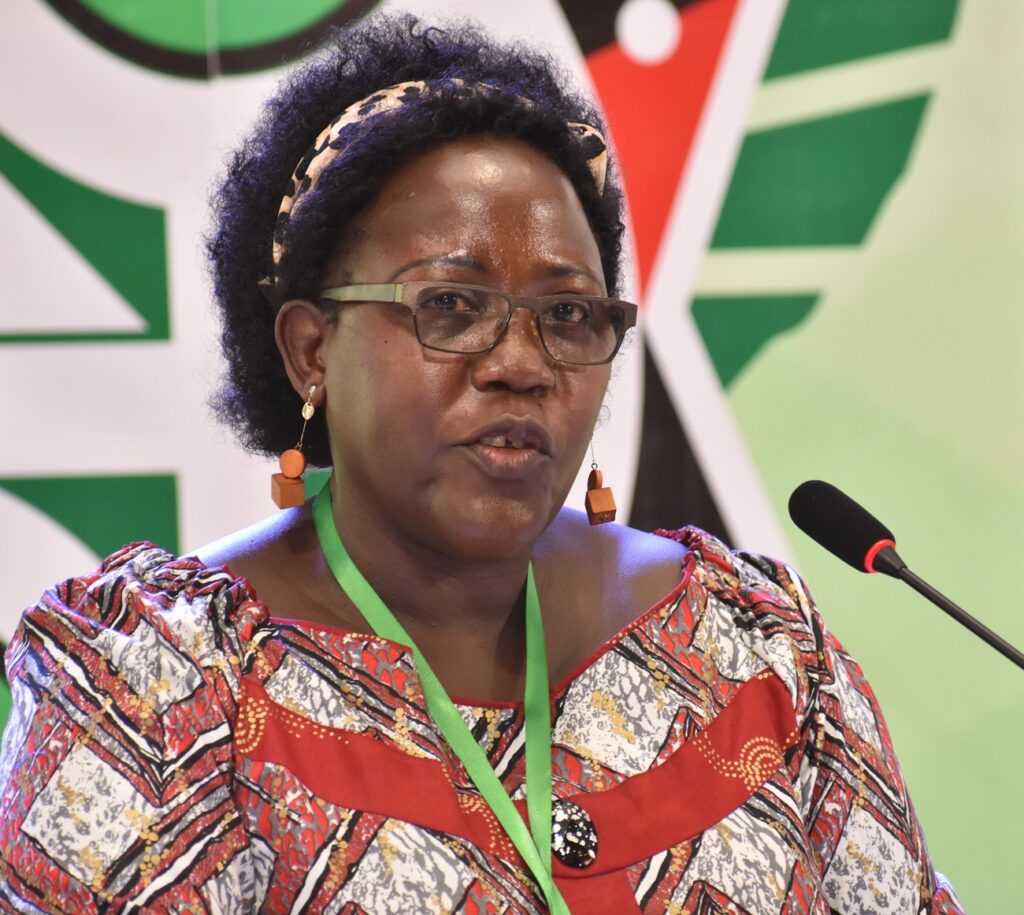
Dr. Ahikire said the School of Women and Gender Studies is one of CHUSS’ youngest units established in 1991 that used to be small but mighty, and has given impetus to the College advocating and promoting gender studies as a cross cutting course permeating through all courses in the college.
She reported that the discourse of gender has been selected as a legitimate consideration that encompasses all human narratives. The Principal thanked the University Management for the institutional support to research and courses that enjoin students at graduate and undergraduate level.
“Management has offered that leadership in mainstreaming gender studies across all units so that we have an institutionalised approach to fighting sexual harassment which is no longer taken for granted.
We appreciate the commitment and the fact that management has been supportive in research and innovations to the point of negotiating research funding from government that has enabled a lot of research across the university”.
Dr. Ahikire also appreciated the gender scholars and activists for investing energy in making a community of women scholars in Africa.
Please click the link below to view a recording of the Opening Ceremony’s Live Broadcast
You may like
-


Mak hosts First African Symposium on Natural Capital Accounting and Climate-Sensitive Macroeconomic Modelling
-
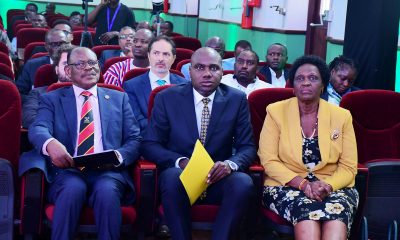

First African Symposium underscores the role of the Centre of Excellence for Africa Climate-Sensitive Macroeconomic Modelling
-


Makerere Launches Scholarly Guide, Calls for Increased Research, Publication and Innovation in Africa
-


How Jimmy Osuret Turned Childhood Trauma into Evidence for Safer School Crossings
-


EU Earmarks Shs19.8bn for 15 Joint PhD Scholarships in Health, Environment Research
-


Mak Hosts NCHE Competence-Based Education Standards Validation Meeting
Humanities & Social Sciences
Dr. Pamela Khanakwa Honored for Steering Record 18 PhD Candidates for the Mak 2026 Graduation
Published
4 weeks agoon
January 23, 2026By
Jane Anyango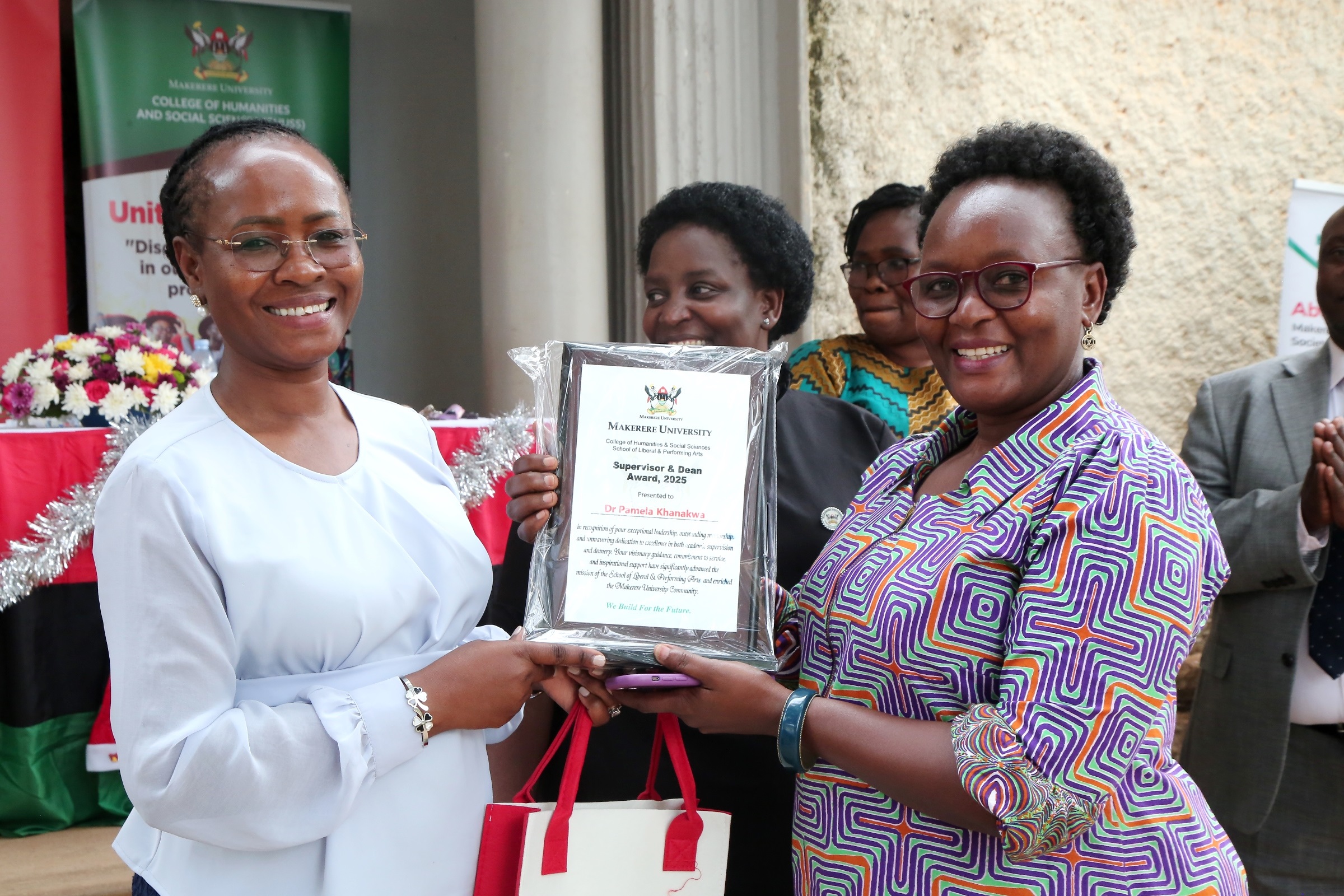
Six personally supervised, three completed in record time, as School of Liberal and Performing Arts sets a historic milestone. Dr. Pamela Khanakwa got the Award as Best PhD Supervisor and Dean
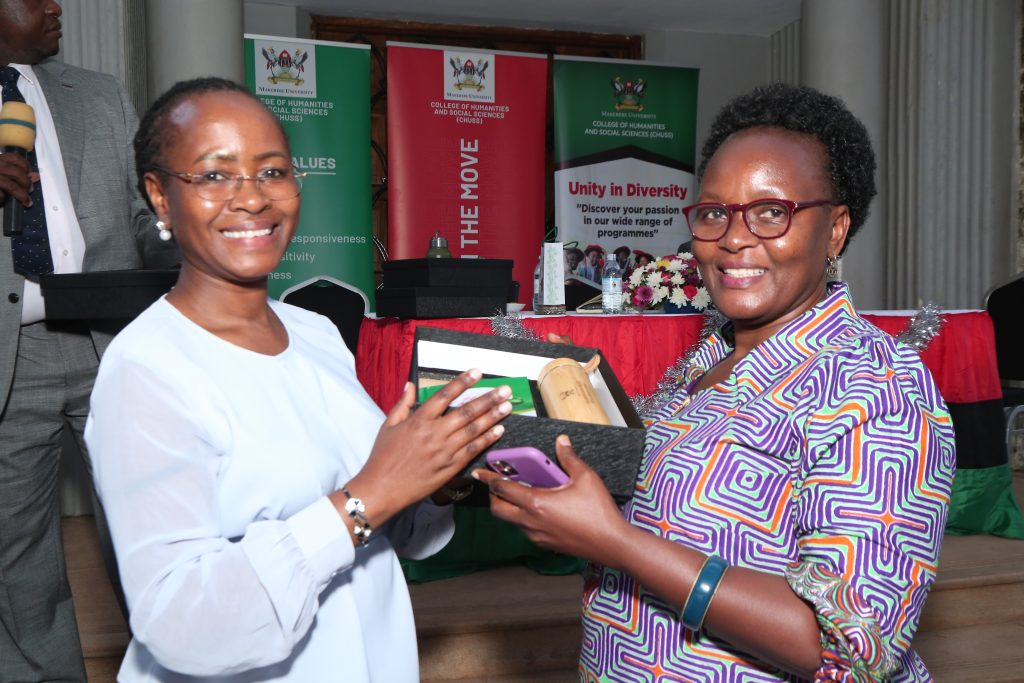
A Historic Academic Milestone for SLPA
The College of Humanities and Social Sciences (CHUSS) recognised the Dean of the School of Liberal and Performing Arts (SLPA), Dr. Pamela Khanakwa, for outstanding academic leadership that has seen the School field 18 PhD candidates for the next 2026 Makerere University Graduation Ceremony scheduled for 24th-27th February. Remarkably, six of these doctoral graduates were directly supervised by Dr. Khanakwa, with three completing within the official three-year timeframe, an exceptional achievement in graduate training. The recognition was announced during the CHUSS End-of-Year Get-Together, where staff applauded Dr. Khanakwa’s dedication, humility, and relentless commitment to postgraduate supervision and timely completion.
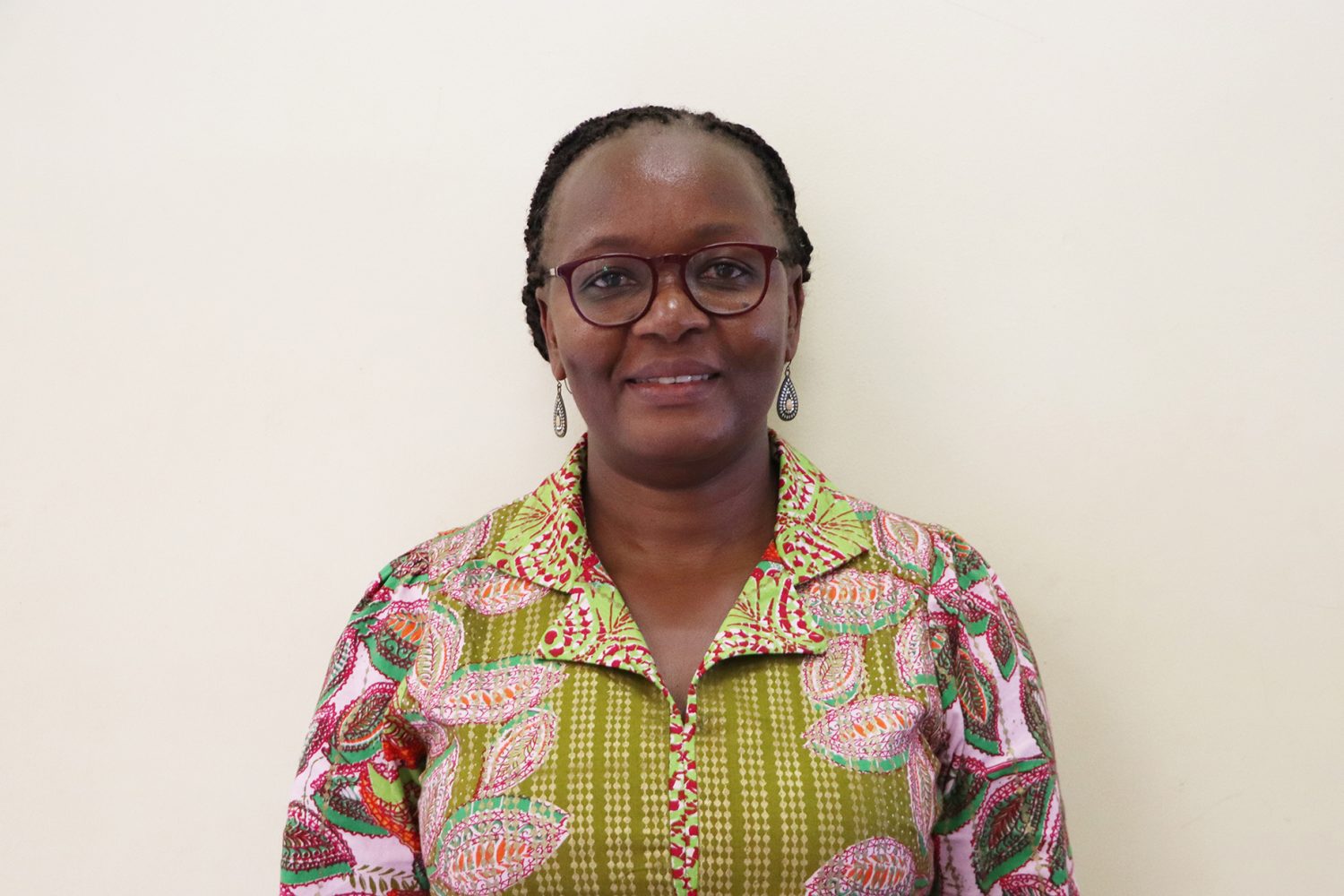
Message to Academic Staff
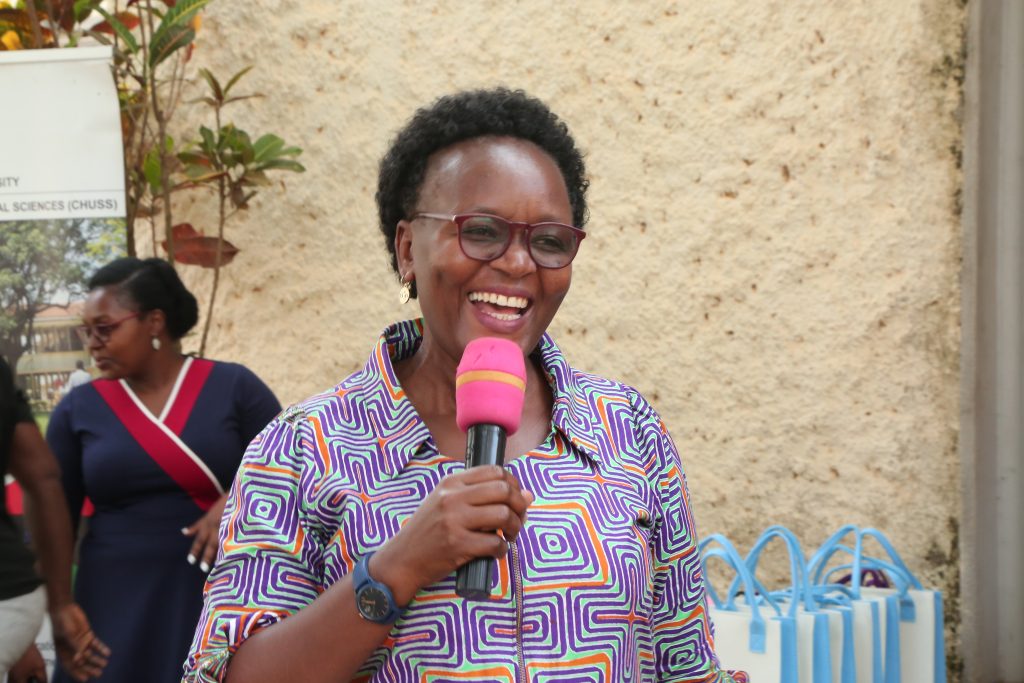
Q: What message do you have for your staff following this achievement?
Dr. Khanakwa:
First, I celebrate my staff and thank them for their dedication to supervision and student support. Academic work is demanding, and material rewards are often limited, but the true satisfaction comes from seeing students succeed.
I encourage my colleagues to remain committed. Yes, the workload is heavy, but many things are possible with dedication and teamwork. Let us continue working for the good of our students, our School, and Makerere University.
Leadership Rooted in Humility
Q: Many colleagues describe you as humble, down to earth, and hardworking. What shapes this character?
Dr. Khanakwa:
I think it is largely my upbringing. My mother was a primary school teacher from the 1950s until the mid-1980s. She worked extremely hard to raise us, combining teaching with farming to ensure we had school fees and basic needs. From her, I learned humility, discipline, and the value of hard work.
I also learned that leadership positions are temporary. You occupy them today, and tomorrow you move on. So humility is essential.
My graduate training also shaped me significantly. My PhD supervisor emphasized that graduate study is a full-time job and that results matter more than noise. Let people see your work through outcomes, not announcements.
Supervision as a Two-Way Commitment
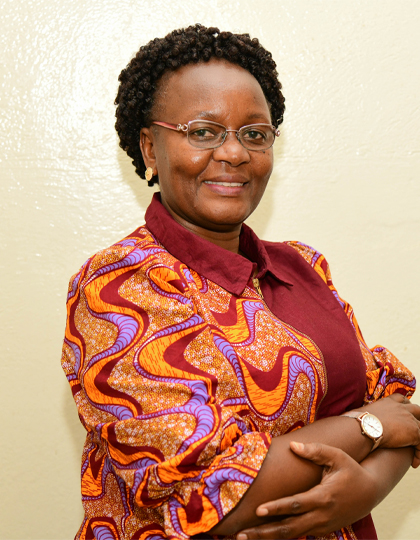
Q: How would you describe your supervision style?
Dr. Khanakwa:
I read my students’ work thoroughly, word by word. Sometimes my comments are tough, but they are honest. Supervision is a two-way commitment. I give feedback, but students must also respond and remain engaged. When that relationship works, progress happens.
Balancing Leadership, Scholarship, and Family
Q: How do you balance being a Dean, scholar, wife, mother, and daughter?
Dr. Khanakwa:
Honestly, I am not sure I balance perfectly. My mother lives far away in Bukwo, so visiting requires careful planning. My children grew up understanding the demands of academic life. I pursued my PhD in the United States and spent long periods away, but we adapted as a family.
Work has become part of my lifestyle. I use weekends to read dissertations, review manuscripts, and write. Sometimes my children ask if I ever sit without working, but this is the commitment I made. As we often say jokingly, “We humbly applied for the job, so let us do the job.”
Scholarship Beyond Supervision
Dr. Khanakwa is also an active scholar and editor. In the past year alone, she has:
- Edited scholarly volumes on archives, memory, method, and pedagogy
- Published a book with Routledge Companion
- Co-authored journal articles and book chapters with graduating students, including Priscah Asiimwe and Anatoli Lwasa Mpijja
“I feel an obligation to write with students,” she notes. “It takes time, energy, and commitment, but it is part of academic mentorship.”
Who Is Dr. Pamela Khanakwa?
Dr. Pamela Khanakwa is the Dean, School of Liberal and Performing Arts, College of Humanities and Social Sciences, Makerere University. She is a seasoned scholar, supervisor, administrator, and mentor whose leadership continues to redefine graduate training excellence. Details about Dr. Pamela Khanakwa can be accessed at: https://chuss.mak.ac.ug/en/personnel/pamela-khanakwa/
More details are available in her attached curriculum vitae.
The CHUSS End- Of-Year-Get-Together
On 12th December, 2025 the college leadership organised a get-together end of year gathering to take stock of the achievements, challenges and brainstorm together on how to move forward. The event was marked by entertainment, team building games, appreciation speeches, sharing a meal and a Christmas package for every staff
Retirees and staff recognised
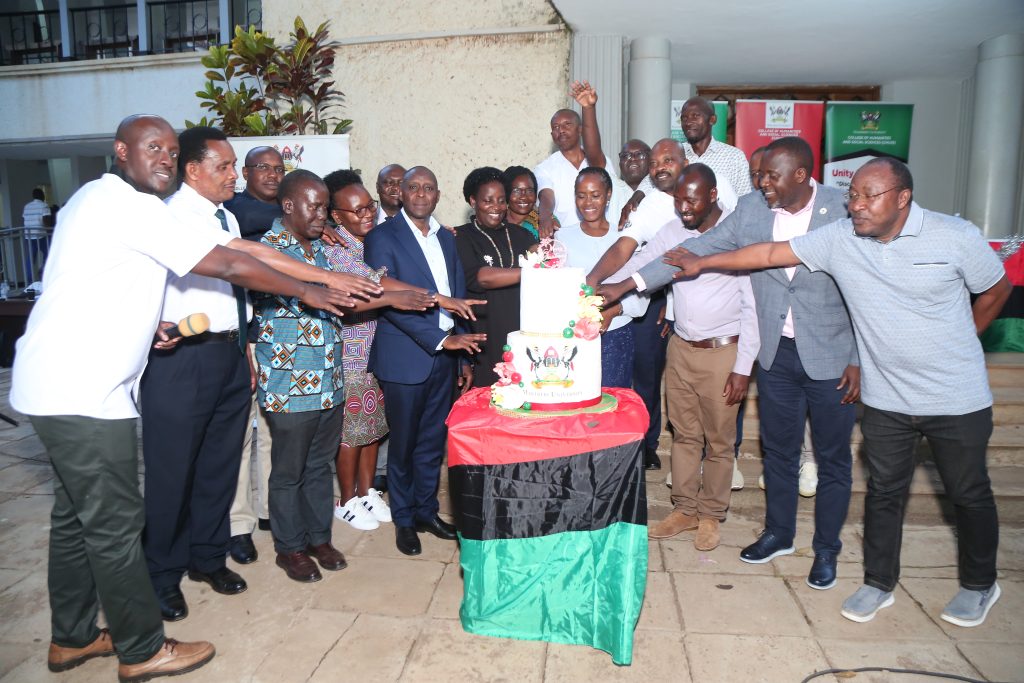
Five retired staff Dr. Micheal Wangotta Masakala, Dr. Anatole Kirigwajjo and Dr. Jackson Kizza Mukas (all from the School of Languages, Literature and Communication), Assoc. Prof. Florence Nansubuga (School of Psychology), Dr. Tusabe Gervase (School of Liberal and Perforing Arts) and Ms. Scovia Nganda Sekweyama (secretary from the School of Social Sciences) were recognised for their dedicated services to the university.
In addition to Dr. Pamela Khanakwa’s Award as Best PhD Supervisor and Dean, Ms. Birabwa Florence scooped the award of Best Registrar of the year. Birabwa is the registrar for the School of Liberal and Performing Arts.
Administrative and support staff including Ms. Mary Gyezaho and Annet Kashumbusha(both administrative secretaries in the Principals office), Farouq Lule (IT Officer), Godfrey Kakooza (cleaner), Charles Sebuguzi (driver) and Jane Anyango (Communications officer) were recognise with awards for outstanding service. Dr. Mohamed Mayanja Kajumba was from the School of Pyschology was recognised as the person with an outstanding talent in Handwriting.
The celebrations held in the Arts quadrangle were graced by the Vice Chancellor Academic Affairs Prof. Sarah Ssali and the Deputy Vice Chancellor in charge of Finance and Adminstration Prof. Ireeta Tumps.
Humanities & Social Sciences
Ugandan Journalists Trained on Peace and Gender-Sensitive Reporting Ahead of 2026 Elections
Published
1 month agoon
January 9, 2026By
Jane Anyango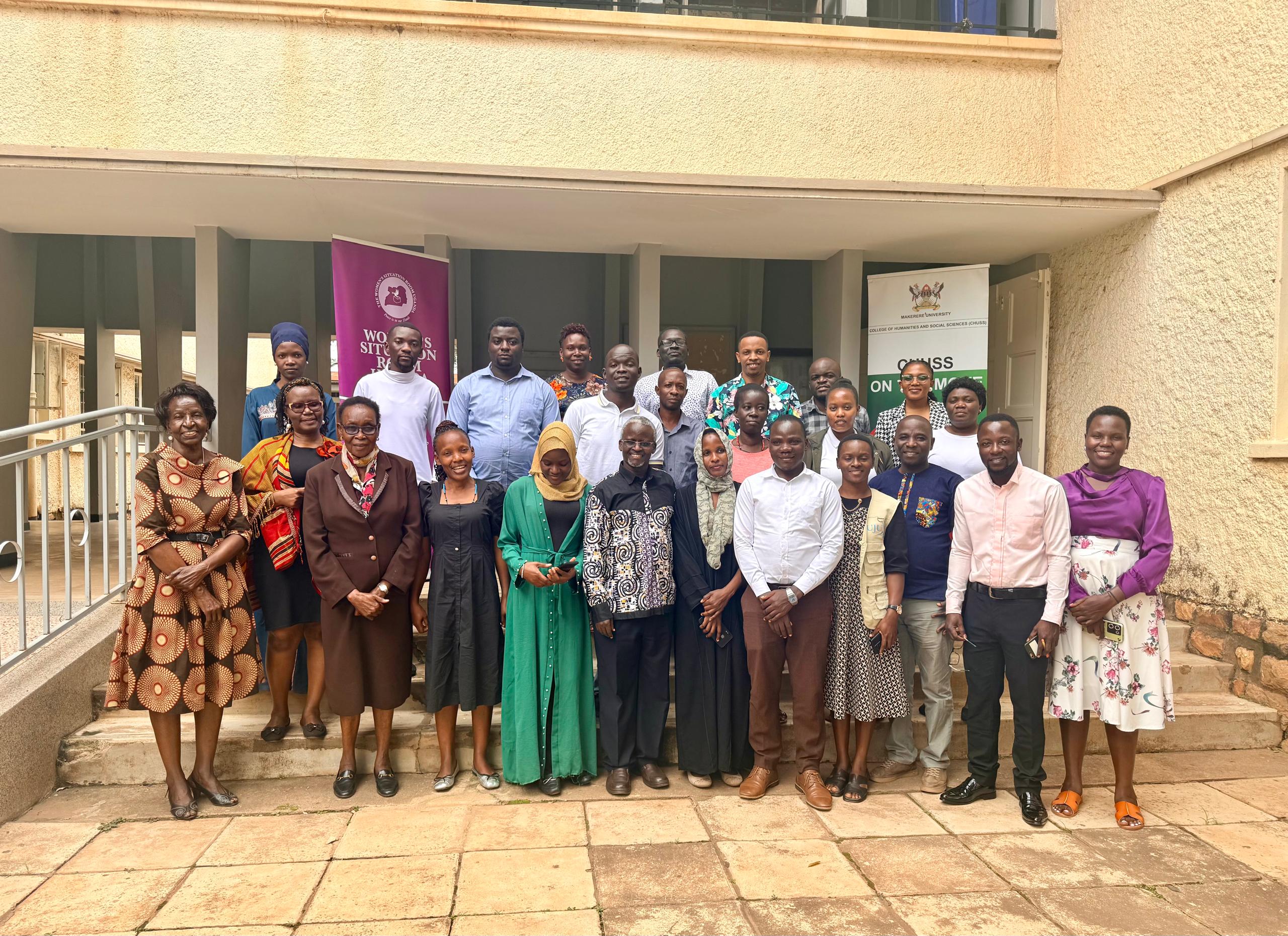
Kampala, Uganda – January 9, 2026
Ahead of the January 15 general elections, Ugandan journalists have undergone specialized training on peace and gender-sensitive reporting to ensure responsible media coverage during the election period. The two-day training, held from 8th to 9th January 2026 at Makerere University’s College of Humanities and Social Sciences Smart Room, was organized by the Women’s Situation Room (WSR) in partnership with various stakeholders and brought together journalists from across print, broadcast, and online platforms.
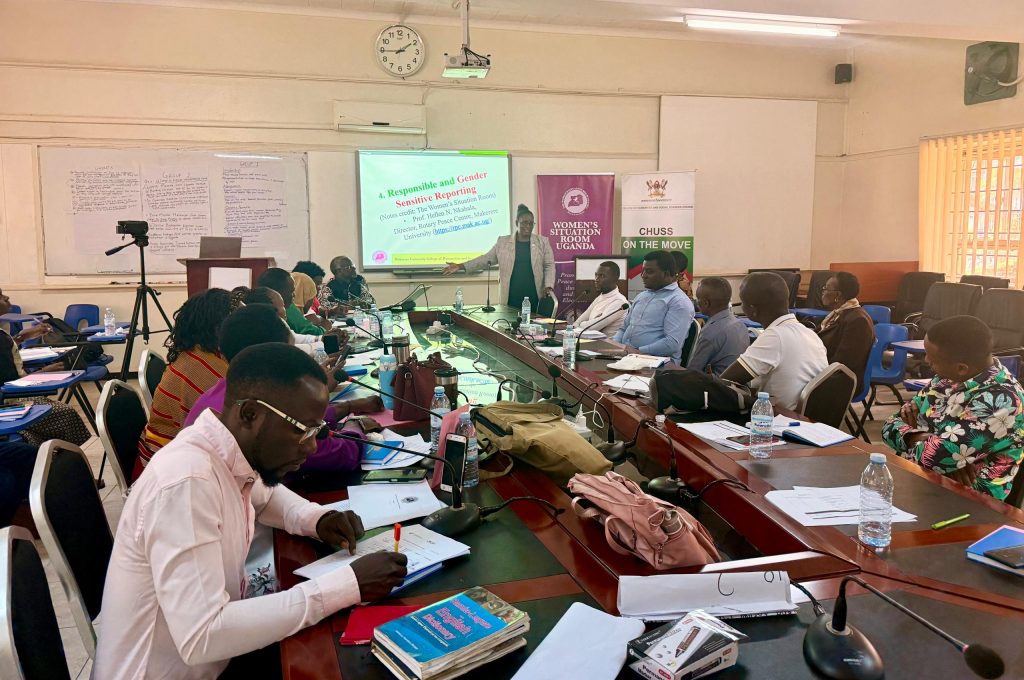
The main objective of the training was to strengthen the capacities of media in reporting and documenting electoral processes in a responsible and gender-sensitive manner. The specific objectives included: strengthening journalists’ skills to cover the 2026 elections in a fair, balanced, gender-sensitive, and non-violent partisan way; enhancing the role of media to enable citizens to be well-informed and actively participate in the election process; ensuring focused and balanced reporting on peace during and after elections; and strengthening partnerships between the WSR and media houses during the election period.
The training covered multiple critical modules. Day one focused on responsible conflict-sensitive reporting, emphasizing principles such as balance, impartiality, and accuracy. Participants explored the role of media as a relayer of the population’s voice, election monitor, catalyst for social cohesion and reconciliation, contributor to the accountability of political actors, and a platform for detecting and debunking digital media misinformation and hate speech.
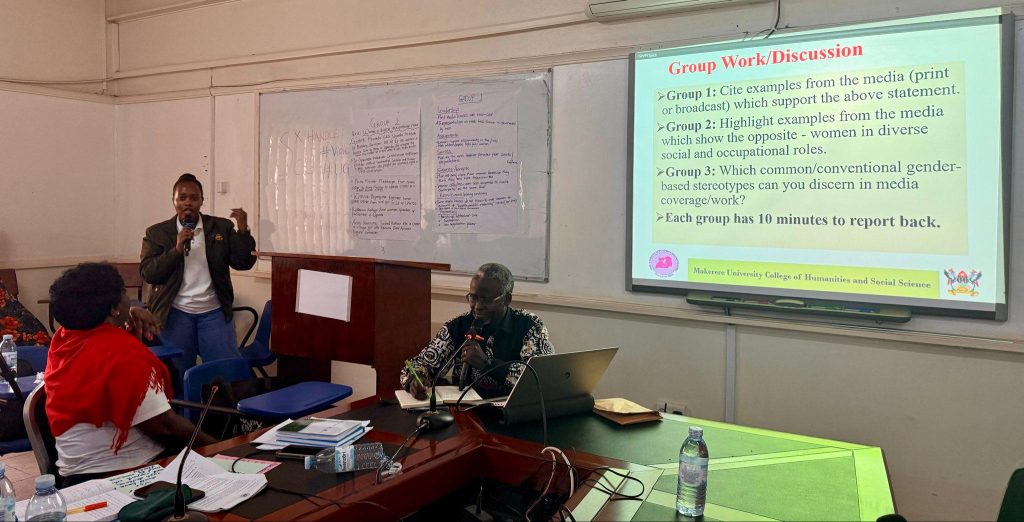
Day two addressed responsible and gender-sensitive reporting. Key aspects included the definition of gender-sensitive reporting, how to become a gender-sensitive reporter, critical elements in reporting with gender awareness, packaging gender-sensitive stories, and a checklist for detecting and avoiding gender-insensitive reporting.
Her Lordship, retired Judge Justice Mary Mayitum, emphasized the importance of peace as the foundation of development and democratic engagement. “Because we value peace more than anything. Without peace, really, you can do nothing. But where there is peace, you can have time to reflect, discuss with others, and join in meaningful dialogue,” she said. She warned that the country’s past conflicts, such as those in Gulu, underscored the necessity of maintaining national harmony.
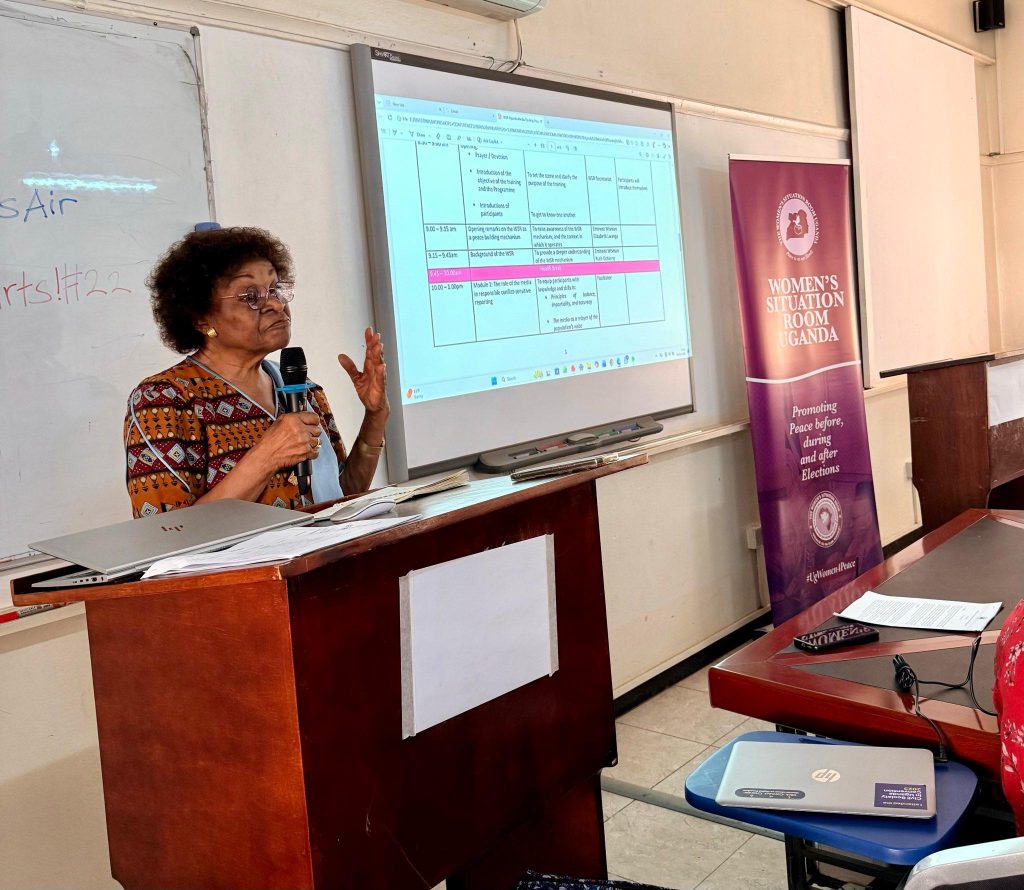
Justice Mayitum also urged other key election stakeholders to uphold peaceful conduct. “Being peaceful is the very heart of life. We have spoken to police, security personnel, political parties, and the Electoral Commission. We want politicians to have a code of conduct and to understand that it’s okay to think differently without fighting or hating one another,” she added.
Dr. William Tayebwa, lead facilitator and senior lecturer in the Department of Journalism and Communication at Makerere University, said, “This training is about conflict-sensitive reporting, peace journalism, and gender-sensitive reporting in the context of the elections. The emphasis was on giving female political candidates a voice while ensuring journalists report responsibly on election-related matters.”
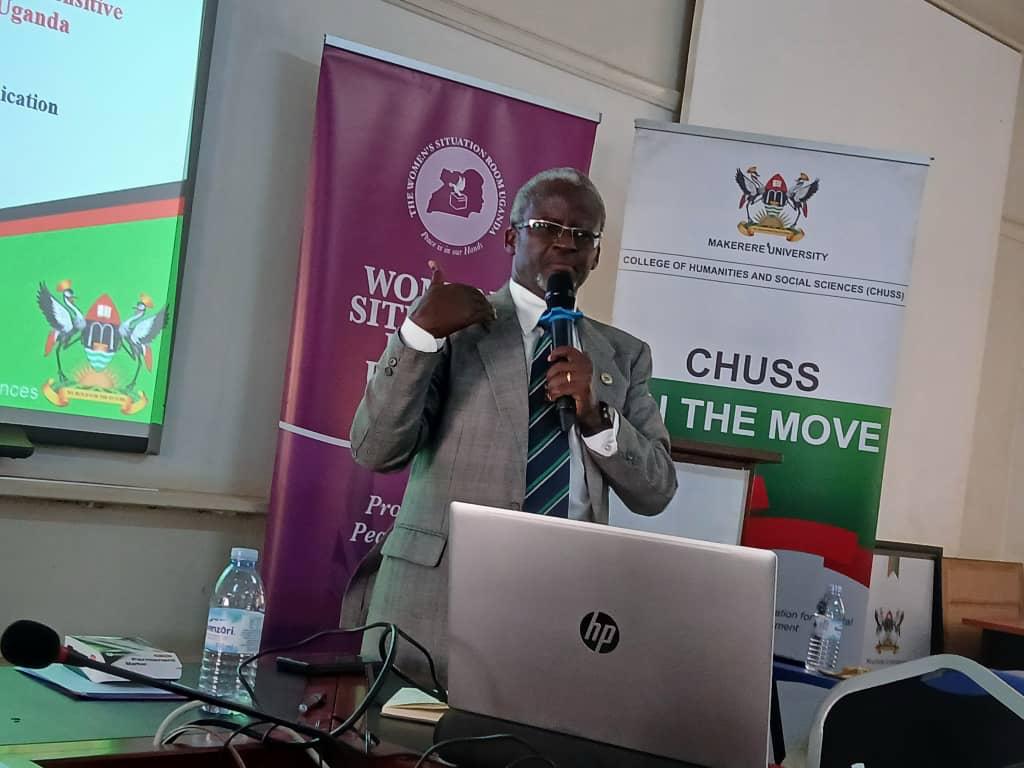
Participants described the training as timely and impactful. Tony Banizengabo of CBS Wakiso District said, “We’ve benefited a lot. We’ve been trained to write stories which bring peace, not conflict. Ahead of the elections, we are very ready to be part of peacemakers.”
Dorcas Kimono of UBC TV Kampala added, “It was so timely and rich. We learned how to report without promoting or fueling violence, giving voice to victims without angering them or encouraging violators. This is very vital, especially as we approach the 2026 elections.”
The training aims to equip media personnel with the knowledge and skills to uphold professional ethics while contributing to a peaceful, inclusive, and gender-sensitive electoral process.
Humanities & Social Sciences
CHUSS Invests Over UGX 100 Million in Interactive Smart Screens, Upgrades Teaching Infrastructure
Published
1 month agoon
January 9, 2026By
Jane Anyango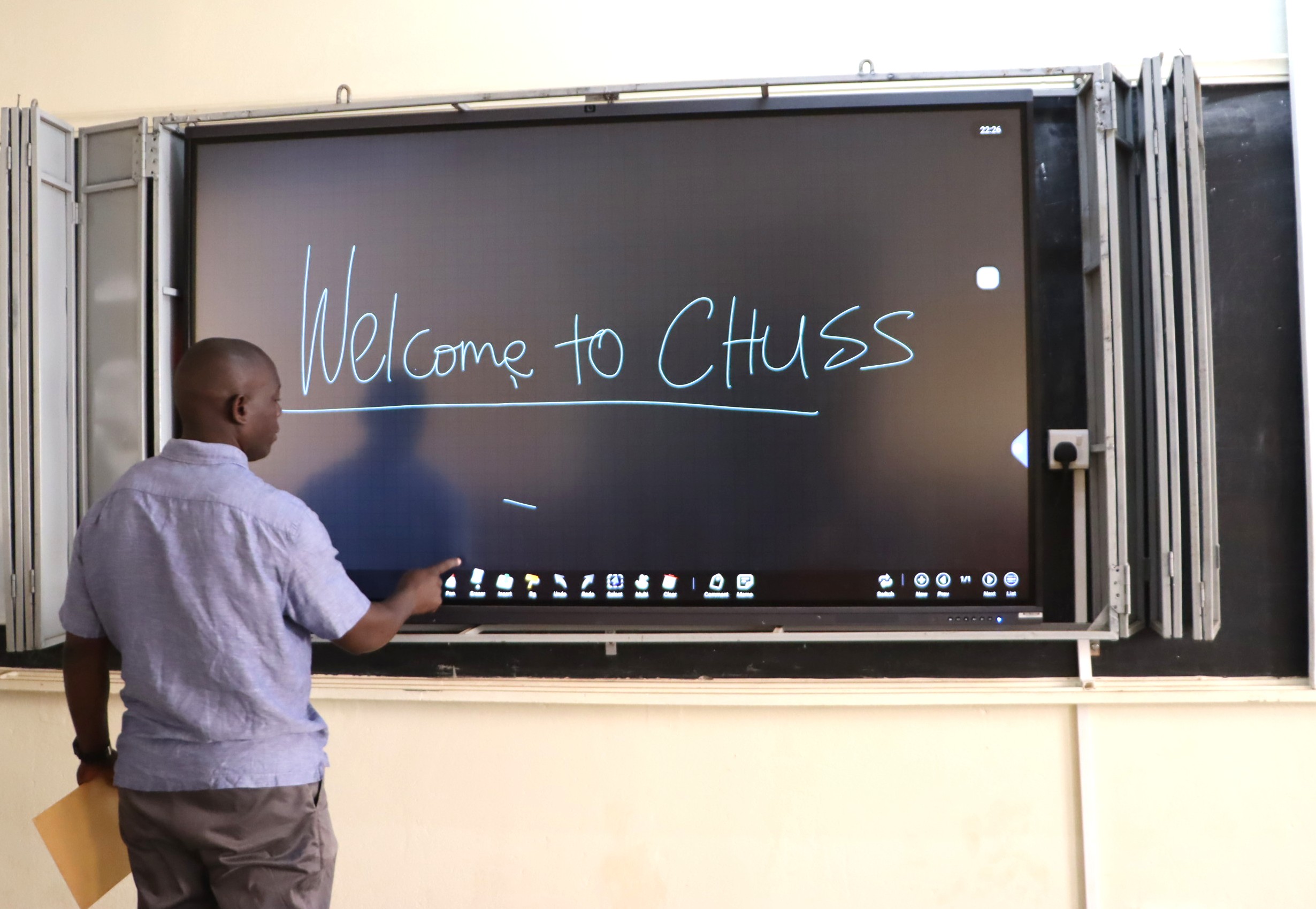
The College of Humanities and Social Sciences (CHUSS) has invested over UGX 100 million in the acquisition and installation of state-of-the-art interactive smart screens, marking a major step in strengthening digital teaching and learning at Makerere University.
Under the investment, 86-inch interactive 4K smart screens have been installed in major lecture rooms across the college’s schools, replacing traditional projectors and whiteboards. The upgrade is intended to modernise instructional delivery, enhance student engagement, and support blended and hybrid learning models.
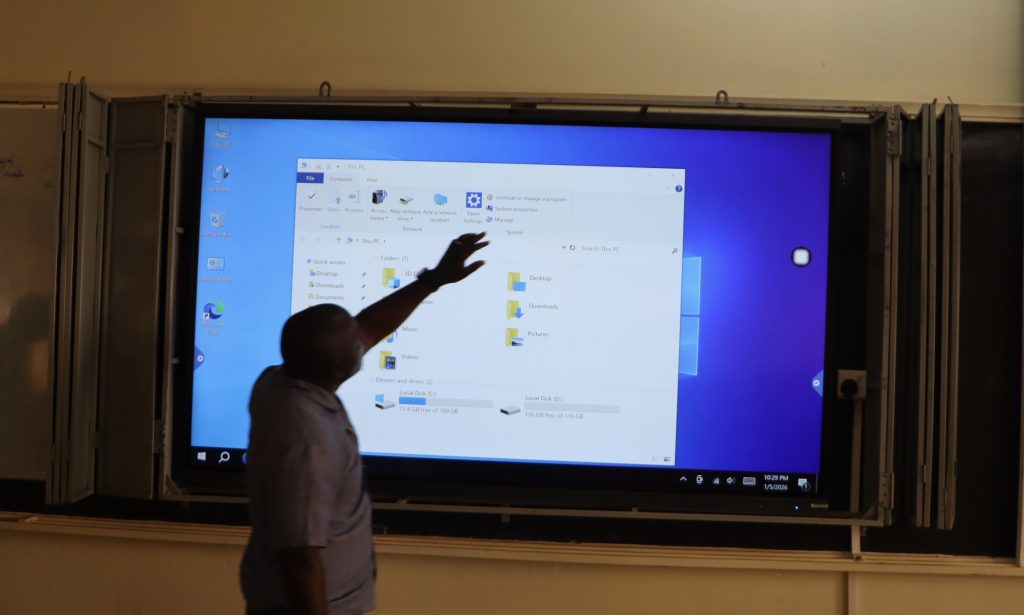
The touch-sensitive smart screens enable lecturers to write, draw, and annotate content directly on the display, while simultaneously integrating multimedia resources such as videos, presentations, and online materials. The screens support wireless screen casting from laptops, tablets, and smartphones, allowing for smooth, cable-free presentations and real-time sharing of students’ work during lectures and group discussions.
Designed to promote interactive and learner-centred pedagogy, the smart screens feature multi-touch capability that allows several users to interact with the board at the same time. This functionality supports collaborative learning, problem-solving exercises, and group presentations, making lessons more engaging and inclusive for students with diverse learning styles.
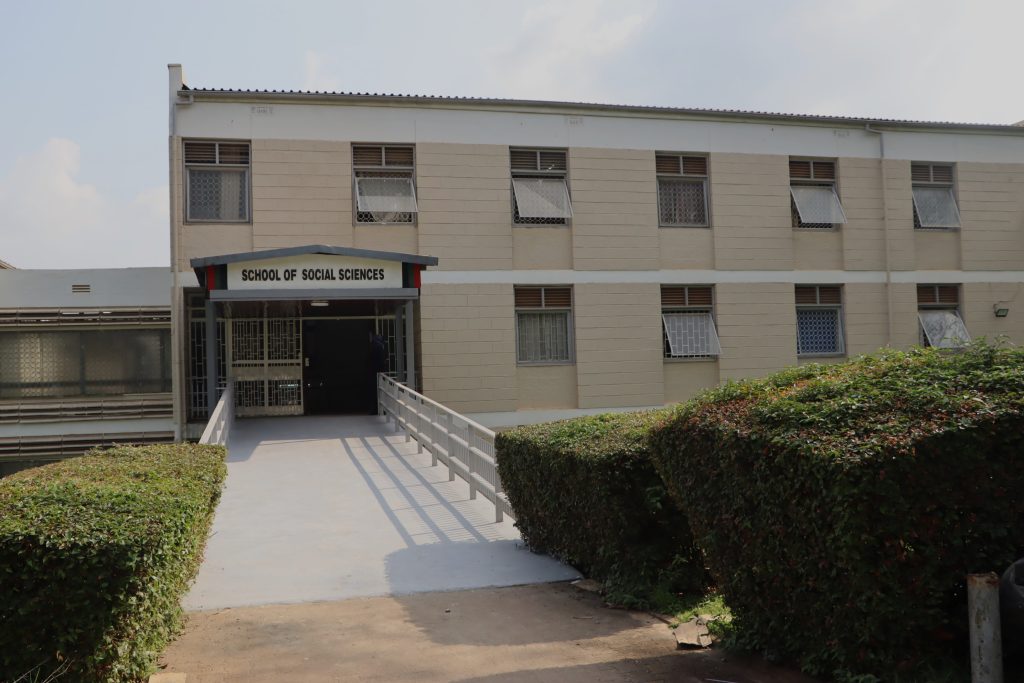
The boards are equipped with built-in cameras, microphones, and speakers, enabling seamless hybrid teaching through platforms such as Zoom, Microsoft Teams, and Google Meet. This allows lecturers to conduct virtual and physical classes simultaneously, record full lectures, and share them with students for later review, revision, or catch-up purposes.
Running on dual Android and Windows operating systems with full internet connectivity, the smart screens provide direct access to online academic resources, digital libraries, and learning management systems. Their AI-powered features further enhance lesson organisation, content clarity, and efficient, paper-free instruction, contributing to a more sustainable learning environment.
To ensure safety and prevent misuse, the smart screens are secured in fabricated metallic safety boxes installed in the lecture rooms.
Beyond digital infrastructure, CHUSS has also undertaken additional physical improvements. The Russian Lecture Room in the School of Languages, Literature and Communication has been furnished with new chairs, tables, and a projector screen, significantly enhancing its teaching environment.
The college has further improved staff working spaces, with the School of Psychology renovating office space and classrooms in Block A, while similar renovations have been carried out in the School of Social Sciences.
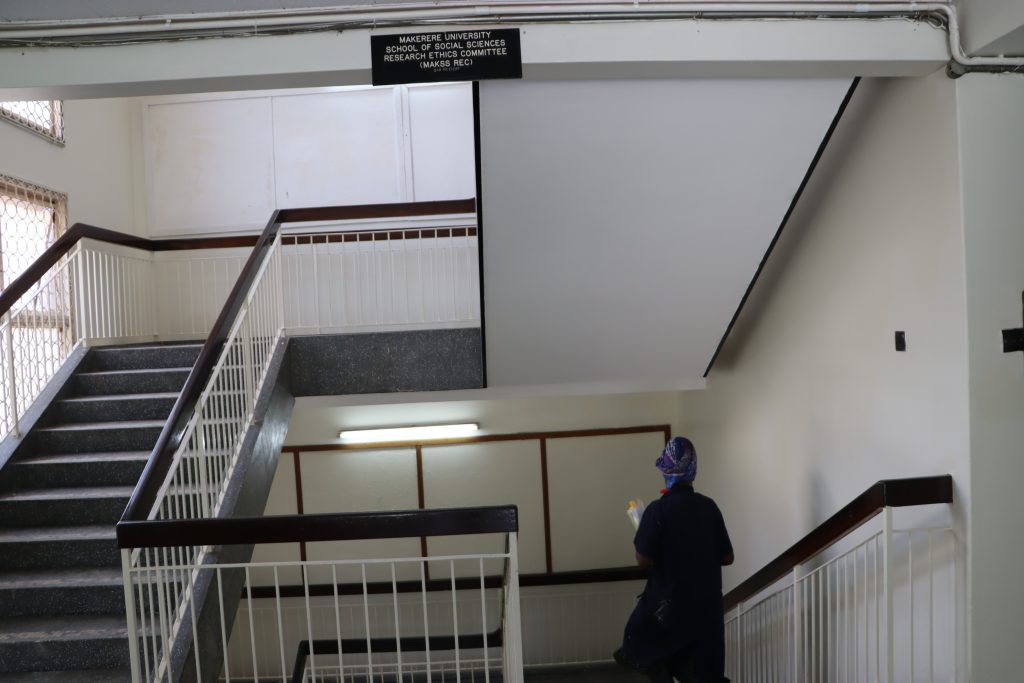
The infrastructural upgrades underscore CHUSS’ commitment to improving the quality of teaching, learning, and staff working conditions in line with Makerere University’s digital transformation agenda.
Trending
-

 General2 weeks ago
General2 weeks agoAptitude Exam (Paper 1) Results for the Mature Age Entry Scheme 2026/2027
-

 Health3 days ago
Health3 days agoUganda has until 2030 to end Open Defecation as Ntaro’s PhD Examines Kabale’s Progress
-

 Health2 weeks ago
Health2 weeks agoHow Jimmy Osuret Turned Childhood Trauma into Evidence for Safer School Crossings
-

 General2 weeks ago
General2 weeks agoFor Youth by Youth – Call for Second Cohort Applications
-

 General3 days ago
General3 days agoMastercard Foundation Scholars embrace and honour their rich cultural diversity
